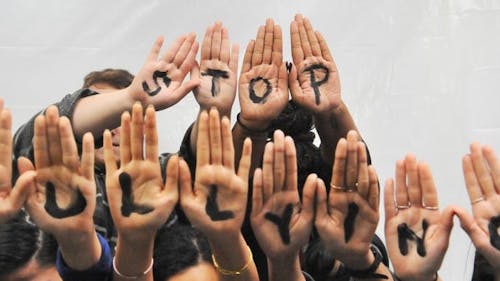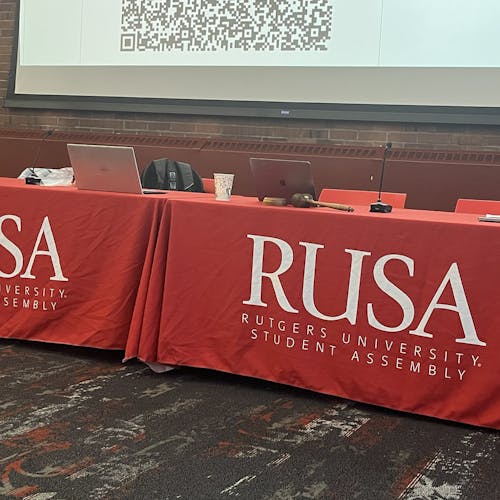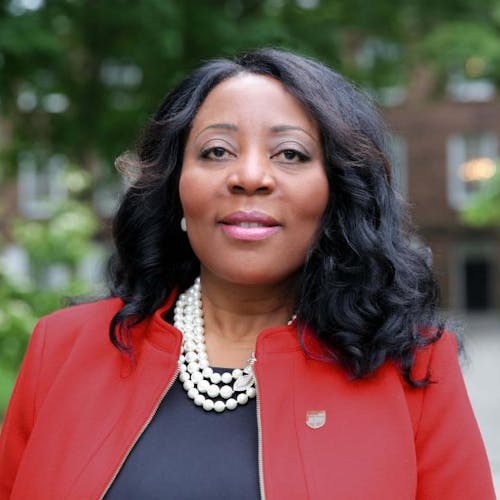Rutgers faculty and students participate in 'Day 1' campaign for bully prevention

Nearly five years after the death of Rutgers student Tyler Clementi, preventative actions against bullying are still a top priority for both faculty and those close to Clementi's story.
Rutgers faculty and incoming students participated in the "Day 1" campaign when Richard L. Edwards, chancellor of Rutgers—New Brunswick, read the pledge at the Aug. 30 first-year student convocation.
“It’s amazing — I think thousands of students heard this,” said Sean Kosofsky, executive director of the Tyler Clementi Foundation, adding how Rutgers was one of the first colleges the foundation went to with their campaign.
The Tyler Clementi Foundation was formed in 2010 after Tyler Clementi, a first-year student, died by suicide after being cyber-bullied at Rutgers, the foundation’s website said.
The "Day 1" campaign asks a person of authority to read a script aloud to a body of individuals — usually students — saying what behavior is expected and what is not tolerated, Kosofsky said.
The authority figure then asks for a verbal confirmation that the instruction was understood, said Kosofsky. This method sets the tone instead of handing out some policy students do not end up reading.
Kosofsky also mentioned how many other initiatives for bullying prevention are based on how to deal with it after it happens.
“Well, what if we can prevent it?” he said. “We decided to create the ‘Day 1’ campaign based on the idea that on the very first day we can prevent something before it begins."
Susan Furrer, director of the Tyler Clementi Center and executive director of the Center for Applied Psychology, said the center works in tandem with the Tyler Clementi Foundation, but has a slightly different focus more applicable to an institution of higher education.
This resulted in having the chancellor read the pledge at first-year convocation instead of in a classroom, Furrer said.
“I think the response (at Rutgers to the pledge) was one of increased awareness and sort of an appreciation of the fact that we really need to learn from each other, be open to each other and be respectful to each other,” Furrer said.
Zaneta Rago, director of the Center for Social Justice Education and LGBT Communities, mentioned how these preventative measures are not just important for Rutgers students, but also for faculty, staff and community members to be able to intervene or report inappropriate behavior.
“The ‘Day 1’ campaign is an added reminder to do that type of intervention and to make sure our campus climate is safe and inclusive and a place that people can call home,” Rago said.
Rago also mentioned how students, after hearing the pledge, could then seek out different experiences and opportunities at campus that have been around for a while.
“The pledge is a wonderful motivator,” she said.
Michelle Dalton, a School of Arts and Sciences junior, said the pledge is definitely a start in taking measures to eventually prevent bullying, or at least take it to a much smaller scale.
“I think students should be more aware of what they’re saying (to others),” Dalton said, “It’s unfortunate that bullying gets in the way of (them having a good time), but if you start out fresh and get them in the right mind set, it could really have long-lasting effects.”
Dalton also said Rutgers needs to do something more active besides the pledge for awareness due to the large size of the University.
Furrer noted how the end-goal of bullying prevention and initiatives like the "Day 1" campaign is to stop bullying, but also about what else can be done.
“Bullying doesn’t come out of nowhere,” she said.
Furrer said it is also important to look at education and awareness to approach these situations.
“The conversation is really about how do we understand each other and ourselves, as deeply and respectfully as we can,” she said.
Faculty and authority figures cannot assume that students learn about bullying prevention at home or at the school they came from, Kosofsky said.
“Rutgers is a leader,” Kosofsky said, “And so if they can be one of the first universities in the country to do this, that’s great for the student body.”



